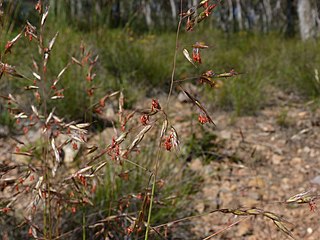
Rytidosperma pallidum, commonly known as red-anther wallaby grass, is an Australian species of tussock grass found in Victoria, New South Wales and the Australian Capital Territory. The grass has flowers in December, and the flowers have a prominent red anther, after which it is commonly named.
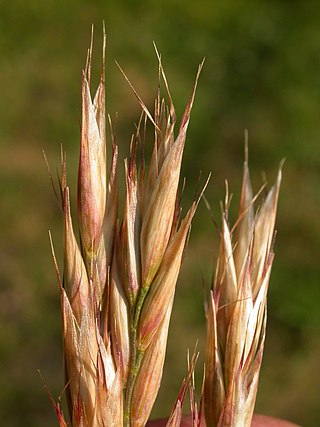
Danthonia is a genus of Eurasian, North African, and American plants in the grass family. Members of this genus are sometimes referred to as oatgrass, but that common name is not restricted to this genus. Other common names include heathgrass and wallaby grass. Australian species have since been reclassified into the genus Rytidosperma.
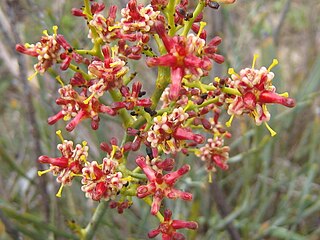
Stirlingia latifolia, commonly known as blueboy, is a plant endemic to Western Australia.
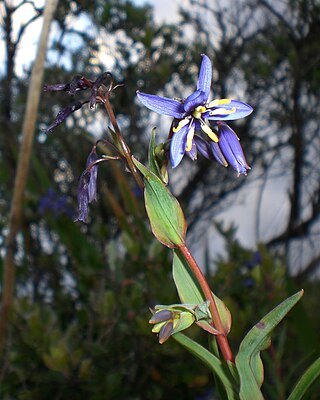
Stypandra is a small genus of rhizomatous perennials in the family Asphodelaceae, subfamily Hemerocallidoideae. They are native to Australia and New Caledonia.
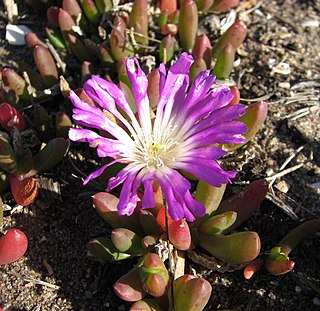
Disphyma crassifolium subsp. clavellatum is the subspecies of Disphyma crassifolium that occurs in Australia and New Zealand. It is sometimes known by the common name rounded noon-flower

Oplismenus is a small genus of annual or perennial grasses, commonly known as basketgrass, found throughout the tropics, subtropics, and in some cases, temperate regions of the Americas, Africa, Asia, and Australia. The systematics of the genus are unclear, with over 100 described species, only 7 species are officially recognized as of 2016.

Acidonia microcarpa is a species of shrub in the plant family Proteaceae. It is the only species in the genus Acidonia. It is endemic to the south coast of the Southwest Botanic Province of Western Australia.
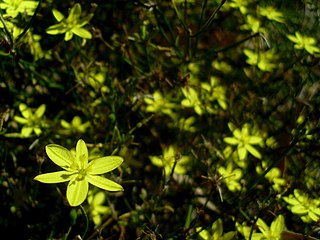
Tricoryne is a genus of perennial herbs in the family Asphodelaceae, subfamily Hemerocallidoideae. All species are native to Australia with two species extending to New Guinea; within Australia they occur in all 6 states and the Northern Territory.
- Tricoryne ancepsR.Br. - New Guinea, Queensland
- Tricoryne corynothecoidesKeighery - Western Australia
- Tricoryne elatiorR.Br. - Yellow Rush-lily - all 6 states plus Northern Territory
- Tricoryne humilisEndl. - Western Australia
- Tricoryne muricataBaker - Queensland
- Tricoryne platypteraRchb.f - New Guinea, Queensland
- Tricoryne simplexR.Br. - New South Wales
- Tricoryne tenellaR.Br. - Mallee Rush-lily - Western Australia, South Australia
Banksia nutans var. nutans is a variety of the plant Banksia nutans. It is native to the Southwest Botanical Province of Western Australia. As an autonym, its name is defined as containing the type specimen of the species.
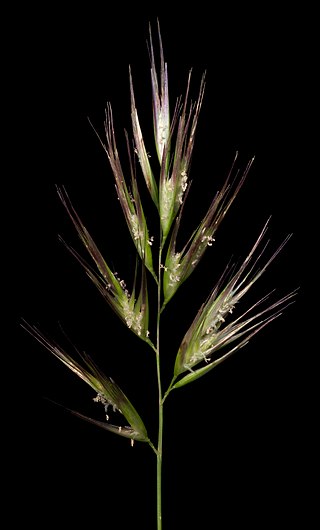
Rytidosperma caespitosum, known by various common names including common wallaby-grass, ringed wallaby-grass, and white-top, is a species of grass native to southern parts of Australia.
Plantago debilis is a species of herb native to Australia. Common names include shade plantain and weak plantain.

Trichodesma zeylanicum, commonly known as Northern bluebell, camel bush or cattle bush, is a herb or shrub native to Australia.
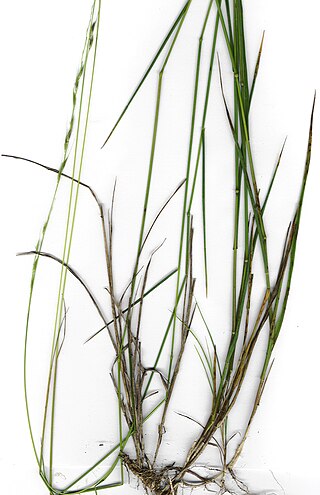
Microlaena stipoides, synonym Ehrharta stipoides, is a species of grass. It occurs naturally in all states of Australia as well as in New Zealand, Papua New Guinea, Indonesia and the Philippines. It has also been introduced into Hawaii and Reunion Island and has been reported as invasive in both. Common names used include weeping grass, weeping rice grass and weeping meadow grass.
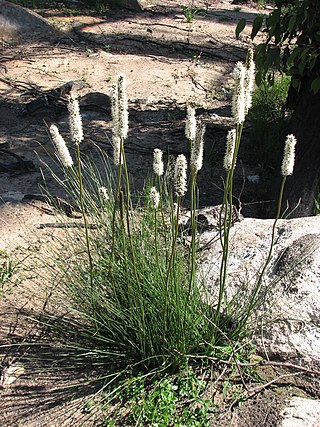
Xanthorrhoea minor is a species of grasstree of the genus Xanthorrhoea native to south-eastern Australia. It was one of the many species authored by the Scottish botanist Robert Brown.

Calochlaena dubia, commonly known as soft bracken, false bracken, common ground fern or rainbow fern, is a small Australian fern in the treefern family Dicksoniaceae. It is very common within its range, and often seen growing under eucalyptus forest, often on the poorer quality soils. It is an easy plant to grow in the garden.

Lomatia silaifolia, commonly known as crinkle bush or parsley fern, is a plant of the family, Proteaceae native to eastern Australia. Naturally found in open forest, it grows as a small shrub 1–2 m high with highly pinnate leaves reminiscent of parsley. The white inflorescences appear in summer.
Needhamiella is a monotypic genus in the family Ericaceae. The sole species, Needhamiella pumilio, is a small shrub that is endemic to Western Australia.

Entolasia stricta, commonly known as wiry panic, is a species of right angled grass in the family Poaceae. It is found in eastern Australia on sandy or sandstone-based soils. The leaves are inrolled or curved inwards and somewhat rough to the touch. It first appeared in scientific literature in 1810 as Panicum strictum in the Prodromus Florae Novae Hollandiae, authored by the prolific Scottish botanist Robert Brown. It was given its current name in 1923.

Deplanchea tetraphylla is a species of tropical rainforest tree, commonly known as golden bouquet tree, wallaby wireless tree or yellow pagoda flower tree, constituting part of the plant family Bignoniaceae.
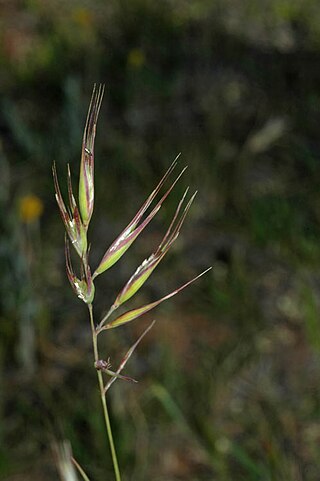
Rytidosperma erianthum, the hill wallaby grass, is a perennial species of grass found in south eastern Australia. Usually found in drier areas in a variety of habitats. The habit is somewhat variable, erect and densely tufted. The grass may grow up to 0.7 m tall.

















